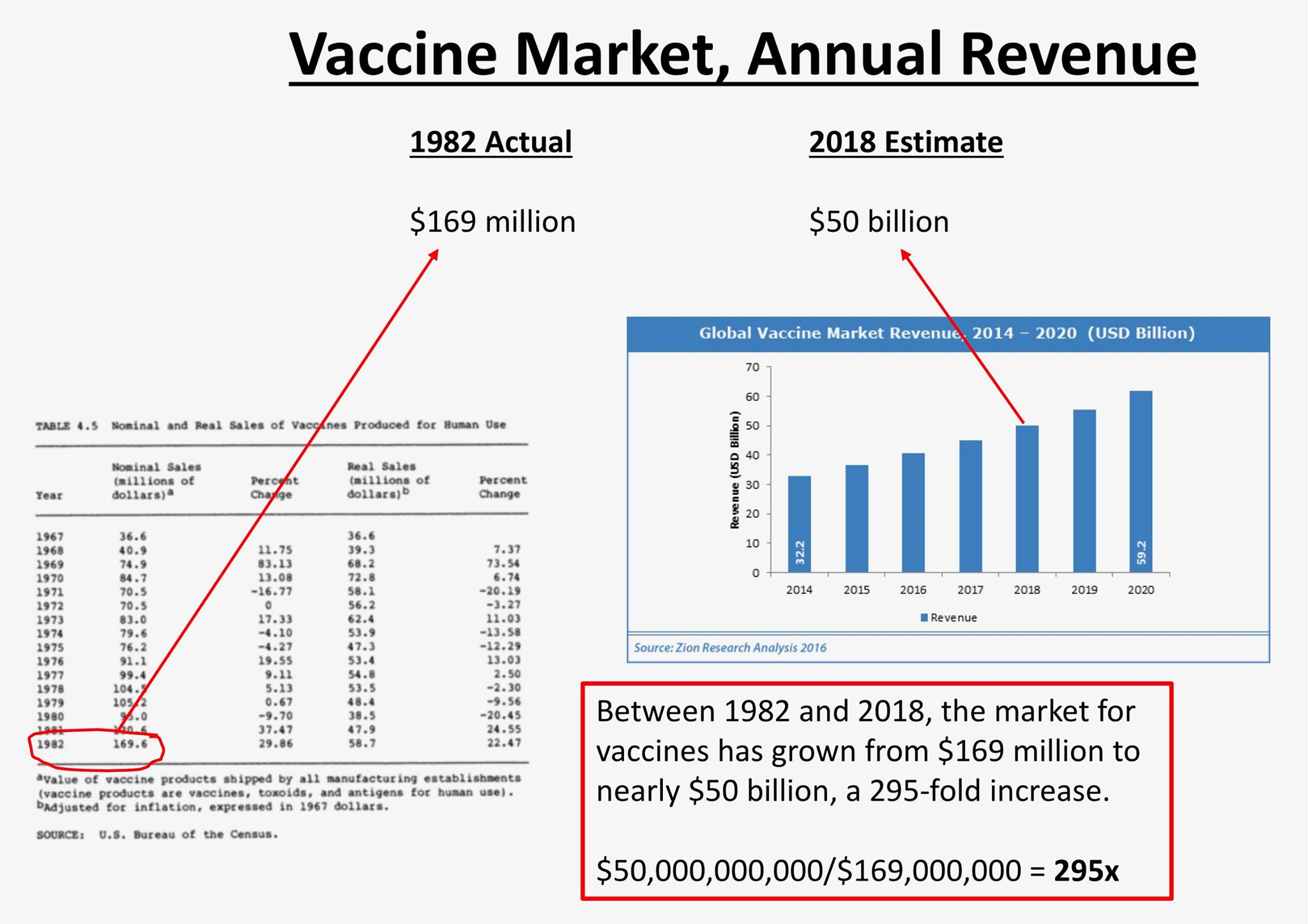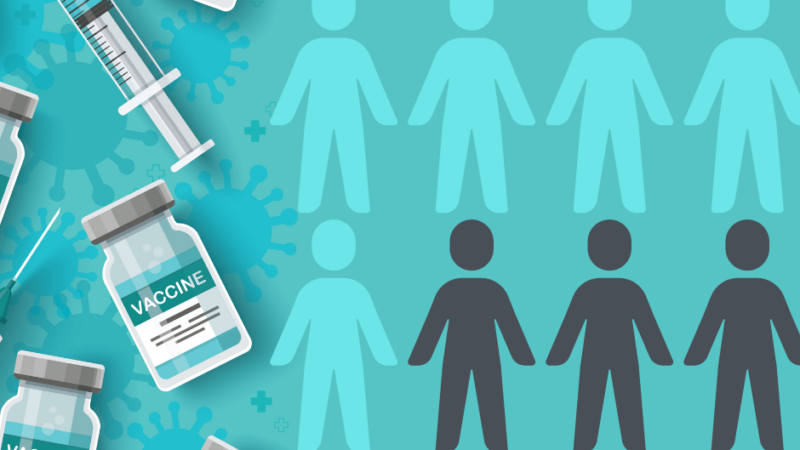Are anti-vaxxers against all modern medicine, or just vaccines?

Are anti-vaxxers against ALL modern medicine, or just vaccines? The question has been posed several times. Here is a well written article by Allie Fujito answering the concerns that many people who find the conflict of interest in the pharmaceutical industry disconcerting, the declining health of our children alarming and the explosive list of mandated vaccines alarming.
Here is my answer to that:
1) The word “anti-vaxxers” is a pejorative, meant to demean and polarize. If I criticize how Ford and Toyota handled their problems with stuck accelerators (denied that there was a problem, produced their own data showing no problem, blamed the drivers….and eventually admitted there was a problem),
that does not make me “anti-accelerator,” “anti-car,” or even “anti-Ford” or “anti-Toyota.”
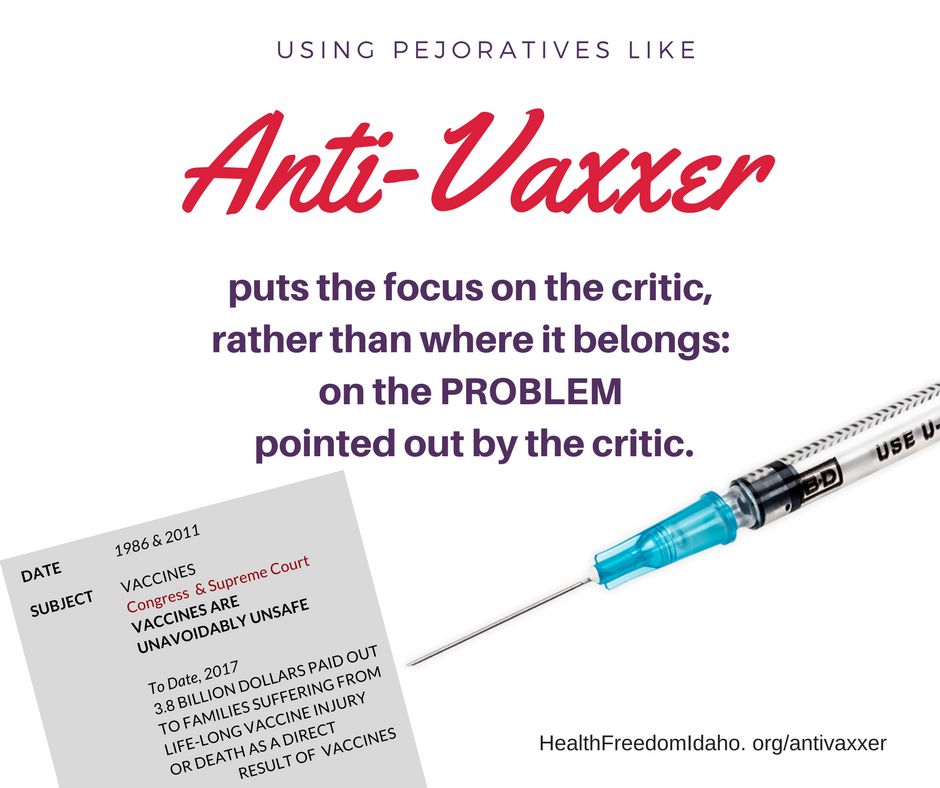
Using pejoratives like “anti-vaxxer” puts the focus on the critic, rather than where it belongs: on the problem pointed out by the critic.
See how that works?
2) Criticizing today’s bloated vaccine program does not mean that the critic is against everything the medical/pharmaceutical industry does.
IT MEANS THAT WE’RE CRITICIZING TODAY’S BLOATED VACCINE PROGRAM.
So let’s stick to discussing THAT.
In case you do not already know:
3) Statins, antibiotics, cough syrup, antihistamines, steroids, antacids, and chemotherapy are not mandated in order for your child to attend daycare, school, or summer camp, nor are they mandated in order to attend college, nor are they mandated to work in a hospital, clinic, doctor’s office, or school. But vaccines are.
4) If you have a severe adverse reaction to statins, antibiotics, cough syrup, antihistamines, steroids, antacids, chemotherapy or any other pharmaceutical product, and you can prove that the product could have been made to have a better safety profile, you can sue the manufacturer.
You cannot sue the vaccine manufacturers. They are protected by the 1986 National Childhood Vaccine Injury Act, which indemnifies all vaccine manufacturers, as well as those who administer them, no matter how severe your reaction is.
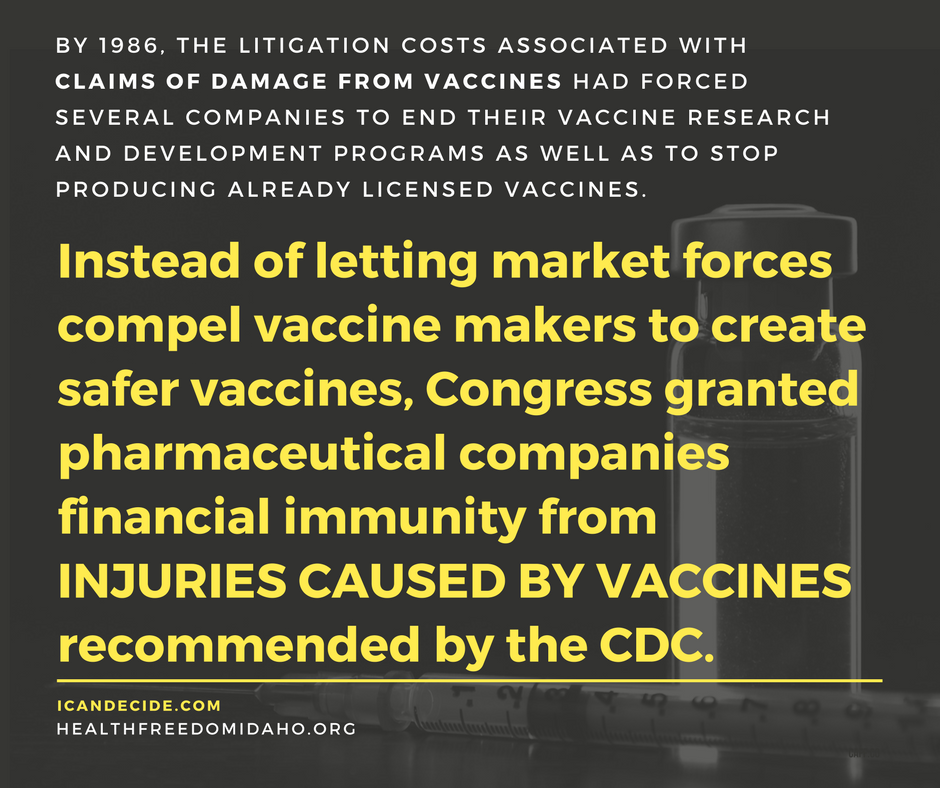
5) If your doctor prescribes a drug that’s inappropriate for you–say, amoxicillin when you’ve already had an allergic reaction to it–you can sue him or her for malpractice.
You cannot sue doctors for giving you the wrong vaccine — say, giving an infant Gardasil, which is not designed for infants, and is not part of the infant schedule –nor can you sue them for giving you a vaccine where a past dose of the same vaccine had already caused you to have a bad reaction. They’re protected by the 1986 National Childhood Vaccine Injury Act.
Their liability free vaccines means that vaccine manufacturers have absolutely no motivation to make vaccines safer. THEY cannot be sued for adverse reactions. THEY staff the government committees that decide the vaccine schedule. THEY define what is and is not considered a vaccine reaction. THEY control legislators via the most aggressive lobbying of any industry.
Here is an excellent discussion of just some of the problems:https://www.ebcala.org/unanswered-questions/vaccine-epidemic
6) Vaccines are not held to the same standard of safety testing that all other pharmaceuticals are required to undergo. Classified as “biologicals,” rather than as “medication,” they are not required to be safety-tested against an inert placebo, nor are they required to show long-term health outcomes.
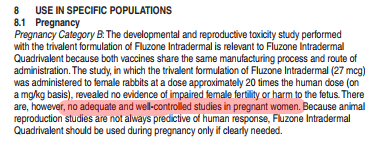
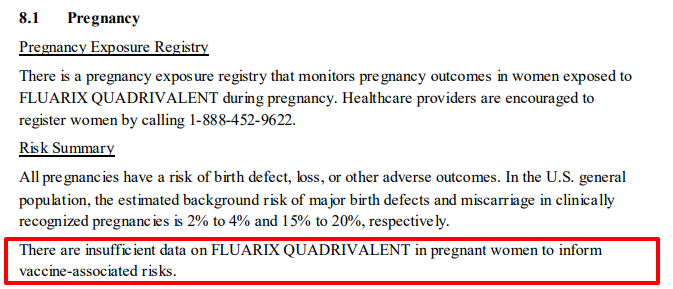
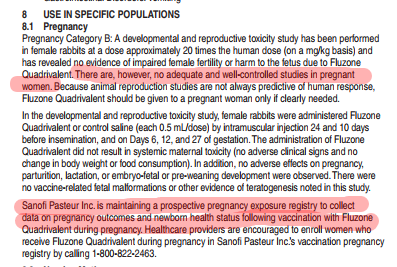
In fact, the package insert for every vaccine clearly states, “___ [this vaccine] has not been assessed for carcinogenicity, mutagenicity, or impairment of fertility.”
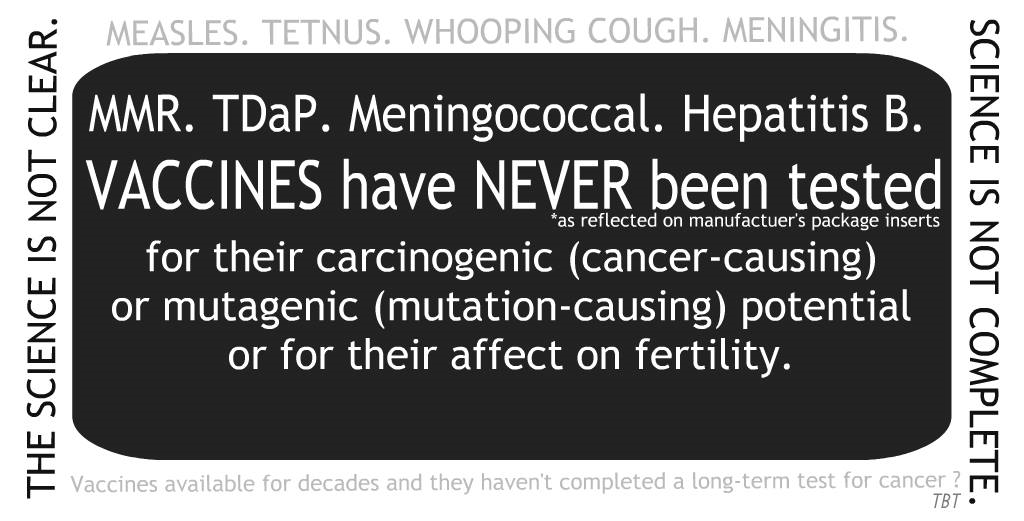
Take a look at how the vaccine schedule increased after the implementation of that 1986 Act. Remember, it protects the manufacturers, not the people who get vaccinated. Keep in mind, the members of the CDC’s Advisory Council on Immunization Practices — who determine which vaccines are on the schedule — are mainly from the vaccine industry.
That’s called “conflict of interest.”
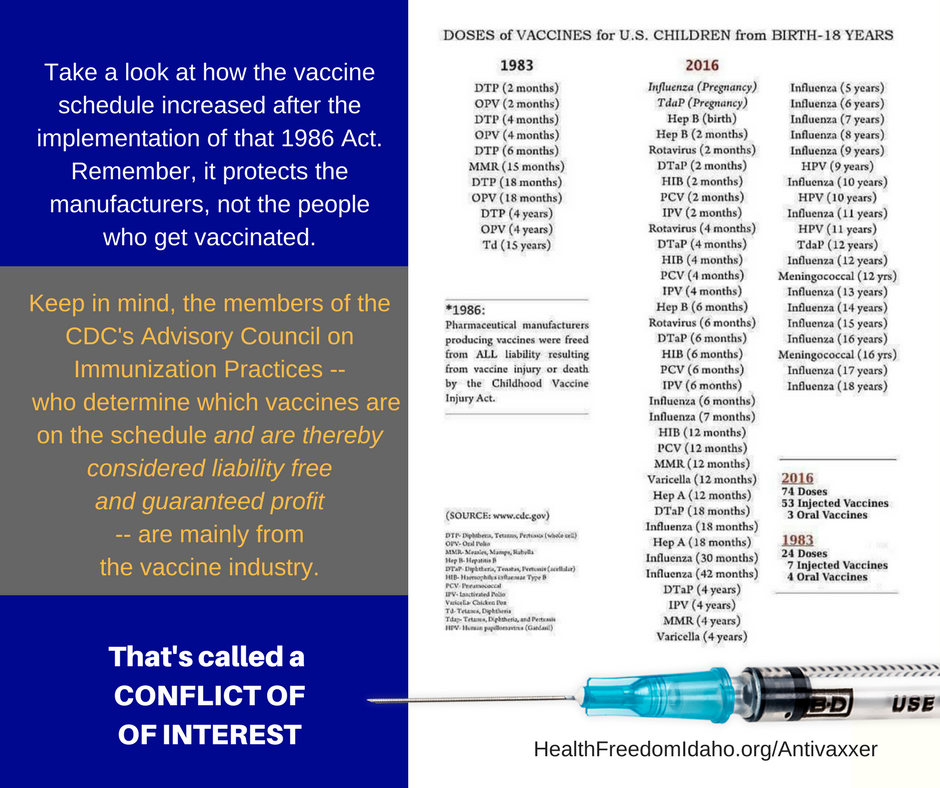
The conversation continued on facebook with these valid points:
If the chances of a severe reaction from a shot are x, and the chances of successfully preventing the disease (that the shot is supposed to immunize against) is y, what values of x and y are acceptable to go ahead with the shot?
Allie Fujito says: You put your finger on a major part of the issue, Grant Sbrocco .
A couple of problems:
- We don’t KNOW what the chances are of severe reactions, because reactions go unrecognized and unreported.
- It’s a bit of a fallacy to compare the chance of preventing a disease with the chance of adverse reaction from the vaccine because many of the diseases we vaccinate for are not problematic for the vast majority who get them.
What we should be looking at is: WHO IS SUSCEPTIBLE?
Who is likely to have complications from disease? What can we do to improve their chances?
Who is likely to have adverse reactions to vaccines?
We know some of these susceptibilities, yet we do NOTHING to screen for them.
- We KNOW that vitamin A deficiency is responsible for most measles complications. And we know that both complications and death rates are low in developed countries. So why is vaccinating the entire population considered the one and only answer?
- We know that some people have genetic mutations, such as MTHFR mutations, that impair the ability to excrete the heavy metals that are in vaccines. We also know of other predispositions, that may be either genetic or acquired, such as mitochondrial dysfunction, celiac disease, and other autoimmune issues. So whey THE HELL aren’t we screening for these issues before vaccinating?
And why has the government allowed vaccine manufacturers to completely skip studying long-term health outcomes between vaccinated and unvaccinated populations?
READ THIS CAREFULLY.
“Objectives: We sought to investigate roles that Merck & Co Inc played in state human papillomavirus (HPV) immunization policymaking, to elicit key stakeholders’ perceptions of the appropriateness of these activities, and to explore implications for relationships between health policymakers and industry.”
“Conclusions: Although policymakers acknowledge the utility of manufacturers’ involvement in vaccination policymaking, industry lobbying that is overly aggressive, not fully transparent, or not divorced from financial contributions to lawmakers risks undermining the prospects for legislation to foster uptake of new vaccines.”
MY TRANSLATION: “We looked at how Merck influences government policy regarding Merck’s most expensive–and most controversial–vaccine. We saw that the entire process is corrupt. We are afraid to say so in so many words.”
https://www.ncbi.nlm.nih.gov/pmc/articles/PMC3483914/
Learn More About @ Icandecide.com
original article above posted by Allie Fujito on facebook October 19, 2017
Here’s some additional points Health Freedom Idaho would like to add:
7) The SAME Pharmaceutical Companies that create vaccines have ALL pled guilty to FRAUD in the last seven years. These companies have NO motivation to create safe vaccines (since any damage their vaccines cause don’t reduce profit). These corporations do not comply to laws in place to protect consumers admitting fraud. See our well cited article at Vaccine Makers Fraud
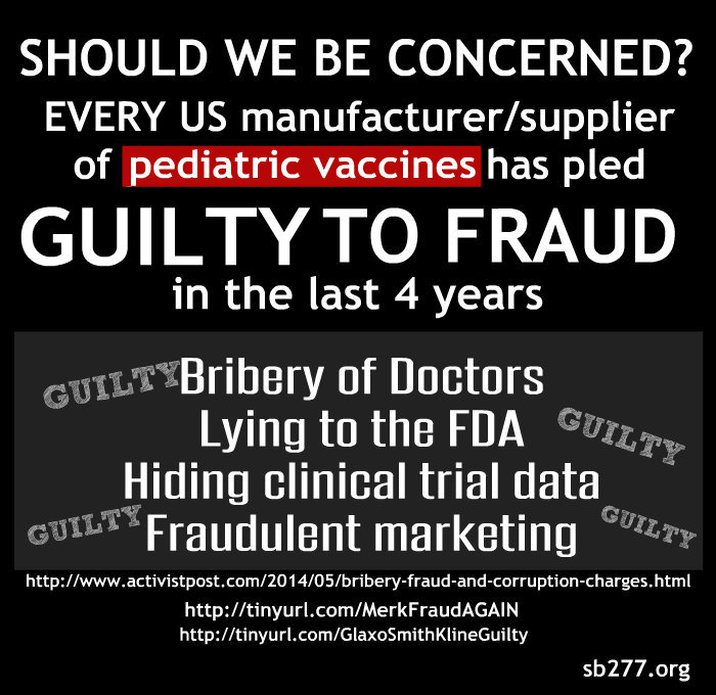
8) Are children healthier NOW then children in the early 80’s? Is this explosive schedule of vaccines REALLY about increasing HEALTH? Or is it about increasing the WEALTH of the pharmaceutical companies. 54% of our children are dealing with chronic (long-term) disease.
Have we traded acute illness for chronic disease?
